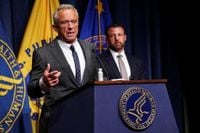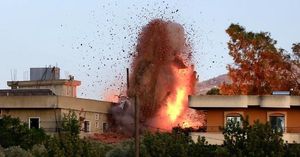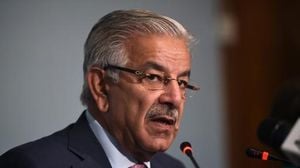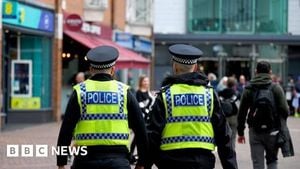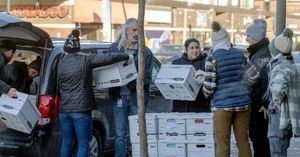On August 8, 2025, the main campus of the Centers for Disease Control and Prevention (CDC) in Atlanta became the scene of a harrowing attack: a gunman, motivated by anger over COVID-19 vaccines, opened fire, unleashing more than 500 rounds into six CDC buildings. As bullets shattered windows and echoed through the corridors, CDC employees scrambled for safety—barricading themselves in offices, hiding in closets, and crouching beneath desks. Amid the chaos, DeKalb County Police officer David Rose was killed while responding to the scene, before the shooter turned the gun on himself, according to reports from NPR and Reuters.
In the days that followed, the shockwaves from the attack reverberated far beyond Atlanta. The CDC, already under intense scrutiny and political pressure, found itself at the center of a new storm—one fueled by mounting concerns over the safety of federal health workers and the role of misinformation in inciting violence. Federal employees from the CDC, National Institutes of Health (NIH), and other agencies rallied together, penning a letter to Health and Human Services (HHS) Secretary Robert F. Kennedy Jr. The letter, released on August 20, 2025, carried the signatures of more than 760 staff—over 600 of them from the CDC alone—with about 330 signing publicly and another 430 requesting anonymity, fearing reprisal.
"When a federal health agency is under attack, America’s health is under attack," the letter declared, as cited by The Atlanta Journal-Constitution. The signatories did not mince words, accusing Kennedy of being "complicit in dismantling America's public health infrastructure and endangering the nation's health" by questioning the CDC's integrity, spreading false claims about COVID-19 vaccines, and fostering an environment that, they argued, contributed to harassment and violence against CDC staff.
The letter outlined a series of demands: Kennedy should stop spreading misinformation, publicly affirm the CDC’s scientific integrity, and guarantee the safety of all HHS workers. It also called for tightened emergency procedures and alerts by September 2, and the removal of high-profile online targeting of federal employees—such as "DEI watchlists" that list CDC staff and their personal information. According to Reuters, nearly 400 current employees signed the letter, many anonymously, highlighting the pervasive fear within the agency.
The attack itself was chilling in its execution and motivation. Georgia investigators revealed that the gunman fired nearly 200 rounds at the buildings (with NPR reporting more than 500 rounds overall), targeting the CDC out of anger toward COVID-19 vaccines. Writings found in the shooter’s home expressed deep discontent, and interviews with family members indicated he believed he had been personally harmed by the vaccine and that it was harming others.
For many at the CDC, the tragedy was not wholly unexpected. Dr. Elizabeth Soda, an infectious diseases physician at the CDC’s National Center for Emerging and Zoonotic Infectious Diseases, recounted to NPR the surreal experience of returning to the campus days later to retrieve her laptop. "I never dreamed I'd see CDC in that state, never dreamed I'd see bullet holes," she said. Soda, who left campus just 30 minutes before the shooting, spent the attack frantically texting colleagues. "Initially, I was shocked," she admitted, "but now that I've sat and thought about it, it's not surprising." She attributed the violence, in part, to years of inaccurate health information and the politicization of science and health.
Dr. Fiona Havers, a former CDC official and letter signatory, echoed these concerns. "It's critical that the scale of this event is recognized and that people that work in public health, and public health in general, are given much more support than they're being given right now," she told NPR. Havers and others noted that inflammatory rhetoric and misinformation about vaccines had escalated in recent months, a trend they said was exacerbated by statements and actions from Secretary Kennedy himself.
Indeed, Kennedy’s tenure as HHS Secretary has been marked by controversy. The letter accused him of calling the CDC a "cesspool of corruption," spreading inaccurate information, and dismantling the nation’s public health infrastructure. Among the most contentious actions cited were his firing of the entire Advisory Committee on Immunization Practices and replacing its members with individuals sharing his views, such as Dr. Robert Malone, who posted images of a machine gun and a provocative meme less than 48 hours after the shooting. Kennedy also canceled $500 million in research funding for mRNA vaccines—a technology credited with saving millions of lives during the COVID-19 pandemic and recognized with a Nobel Prize.
The letter further highlighted Kennedy’s insistence on a debunked link between the measles vaccine and autism, and accused him of misusing data to undermine public confidence in childhood vaccination. The staffers called on Kennedy to publicly disavow false or misleading claims about vaccines and infectious diseases, and to reaffirm the CDC’s commitment to nonpartisan, evidence-based science. As Reuters noted, the letter was also sent to Congress and the White House, underscoring the gravity of the situation.
In the immediate aftermath of the attack, the CDC took swift action to bolster security. Most employees worked from home, and vehicle decals identifying CDC staff were removed to protect their identities. The heightened anxiety was palpable, and the call for leadership and reassurance from the top grew louder. Yet, many employees found Kennedy’s response wanting. While he did visit Atlanta to tour the campus and meet with the CDC director and the widow of Officer Rose, and posted on social media that "no one should face violence while working to protect the health of others," staff noted the absence of any direct condemnation of the misinformation that motivated the shooter or a full-throated defense of the CDC’s mission.
In a broadcast interview with Scripps News days after the attack, Kennedy doubled down on his skepticism, stating, "Public health agencies have not been honest," and arguing that "trusting the experts is not a feature of science or democracy, it's a feature of totalitarianism and of religion." Such remarks, staffers argued, only deepened the sense of betrayal and vulnerability among federal health workers.
The broader context for this unrest is a landscape awash in misinformation. A survey released by The Physicians Foundation on August 20 found that 86% of doctors had observed an increase in misinformation from patients over the past five years. For those on the front lines of public health, the risks now appear not just theoretical, but terrifyingly real.
As the September 2 deadline for Kennedy’s response approaches, CDC and HHS employees remain anxious but resolute. Their message is clear: the safety of those who work to protect the nation’s health cannot be taken for granted, and the integrity of public health science must be defended—now more than ever.
